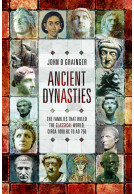Sextus Julius Frontinus and the Roman Empire (Hardback)
Author of Stratagems, Advisor to Emperors, Governor of Britain, Pacifier of Wales
Imprint: Pen & Sword Military
Pages: 320
ISBN: 9781399051224
Published: 18th May 2023
(click here for international delivery rates)
Order within the next 2 hours, 16 minutes to get your order processed the next working day!
Need a currency converter? Check XE.com for live rates
| Other formats available - Buy the Hardback and get the eBook for £1.99! | Price |
|---|---|
| Sextus Julius Frontinus and the… eBook (9.7 MB) Add to Basket | £6.99 |
Sextus Iulius Frontinus is best known as author of the military handbook Strategems but, in addition to writing this and other works (now lost), he also had a varied and surprisingly influential career in military and civil posts around the Roman Empire.
Frontinus loyally served at least six emperors, often acting as a trusted counsellor, and even deputized for Trajan while he was busy in Germany and elsewhere. He was possibly the longest-serving governor of Britain (five years), where he completed the subjugation of Wales and established the frontier in northern England at the Ribble-Tees line. He founded several legionary fortresses, including those that later became the towns of York, Chester and Caerleon. He also served on the Rhine, in Spain and Asia and in the civil sphere reformed the water supply of Rome.
John Grainger has written the first full biography of Frontinus. Reconstructing his life to the fullest extent permitted by the sources, he favourably re-evaluates his importance, particularly in Britain (at the expense of the better-known Agricola. Froninus' career, the author concludes, is one of the most varied and significant of any that can be reconsructed for any Roman who did not become Emperor.
“…a substantial study of an important life in the early Roman Empire in which Grainger has successfully shown how perhaps his subject’s greatest achievement was his ability to be on good terms with six different emperors (from Nero to Trajan) and thus exert significant influence throughout his career.”
The Journal of Military History
A solid work of meticulous and documented research, "Sextus Julius Frontinus and the Roman Empire: Author of Stratagems, Advisor to Emperors, Governor of Britain, Pacifier of Wales" is an extraordinary, seminal, and deftly written contribution personal, professional, community, and academic library Roman Empire History/Biography collections and supplemental curriculum studies lists. Of special note for students, academia, and non-specialist general readers with an interest in the subject that "Sextus Julius Frontinus and the Roman Empire: Author of Stratagems, Advisor to Emperors, Governor of Britain, Pacifier of Wales" is also available in a digital book format.
Midwest Book Review
Read the full review here
A thoroughly enjoyable book to read covering Roman history. I would recommend reading of this book to anyone interested in Roman history.
NetGalley, Lional Jones
Rating: 5 out of 5 stars
NetGalley, Janalyn Prude
I found this book to be so interesting and a treasure trove of things most people didn’t even know they wanted to know about Julius Frontinus and then some. I can take a non-fiction book like this and have it read in one day, I love to note things that I don’t already know and this book was right up my alley. If you’re a lover of Roman history or just international history you’ll love this book.
Rating: 5 out of 5 stars
NetGalley, Nathan Uglow
What I know about Frontinus before reading this unusually detailed yet accessible book was that he was a Roman governor of Britain who later wrote books about aqueducts. The author adds a surprising amount of detail about all the other aspects of Frontinus' varied and interesting career, which had started under Nero, but got a sudden and dramatic boost under his successor, Vespasian, flourishing under Domitian (boo), Nerva (hooray), and Trajan (on the fence). Following Frontinus we learn about the imperial court, Roman Armenia, Gaul, Britain, Germania, and Syria. Taken together this biography of Frontinus is pretty much a history of Rome at the end of the first century.
The opening chapter speculates about how Vespasian could have come to place such great trust in him, raising him from almost nowhere to the top jobs. In this chapter the book's characteristic method is made clear. It is a mix of informed understanding of the systems and processes that governed Roman social/imperial promotions, a thorough gathering of the social networks that we do know about, and careful speculation about the most likely way it would all have fitted together. Each chapter works in a similar way, as each phase of his career is a kind of mini-puzzle whose solution required orderly and precise reconstruction.
This kind of approach - biographies keyed to elite social networks in institutional contexts - is associated with Ronald Syme and the Routledge Imperial Biography series (mainly written by Syme's former students and like-minded scholars, such as Patricia Southern, Barbara Levick, AR Birley, and Miriam Griffin. Grainger wrote the biography of Nerva). So, there is a huge amount of knowledge in each chapter, but it is presented thoughtfully - we are taken through the what, why, and how of it all with great care.
I would say the book is easier reading than that Routledge series because Grainger, here, gives you the information and helps join-the-dots and interpret it as well. You read the Routledge biographies and you are amazed at the intelligence of the author; you read this book and you are amazed at how clever you feel (to borrow Queen Victoria's contrast between talking to Gladstone and Disraeli). As a prolific author on fairly obscure corners of the ancient world, Grainger manages this balancing act between erudition and explanation unusually well. He makes it look easy, but it isn't.
The final chapter is called 'The Man', but what the book offers is more of a CV/social profile - Frontinus was talented, efficient, and easy to work with. We know his social and political networks (for me this is the book's strongest feature) and how he played to the qualities they valued and what rewards he reaped from doing so. In an age of social profiles (professional personas) we know there is another bit of us that isn't quite 'that' - but that is a bit inaccessible here and in a status culture like Rome (without our high-value on authenticity) perhaps Grainger's biography is the most relevant.
If you ended up liking this then you might want to try John Henderson's biography of Rutilius Gallicus (an exact contemporary of Frontinus) - Henderson's book is a bit whackier than Grainger's. Syme's biography of Tacitus, another contemporary, is closer to Grainger's style, as is his own biography of Nerva. I love reading Grainger's books - and he writes a lot of them - but this is one of my favourites.
About John D Grainger
JOHN D GRAINGER is a former teacher and historian of great experience with a particular interest in Classical and Hellenistic Greek history. His many previous works include the following for Pen & Sword: Hellenistic and Roman Naval Wars (2011); The Wars of the Maccabees (2012); Roman Conquests: Egypt and Judaea (2013); a three-part history of the Seleukid Empire (2014-16), King’s and Kingship in the Hellenistic World 350-30 BC (2017), Antipater’s Dynasty (2018), Ancient Dynasties (2019, The Roman Imperial Succession (March 2020), The Straits from Troy to Constantinople (2021) and The Forty Sieges of Constantinople (2022). He lives in Evesham, Worcestershire.





















